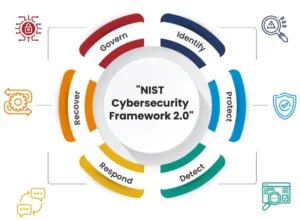
Table of Contents
In a digital era where data is king, the demand for cybersecurity professionals is skyrocketing. As organizations navigate an ever-evolving threat landscape, the need for skilled individuals to safeguard sensitive information has never been more critical.
If you’re considering a career in cybersecurity or looking to switch roles within the field, here’s a comprehensive guide to the top 10 cybersecurity jobs in 2024, along with insights into the career paths and salary expectations.
1. Cybersecurity Analyst
- Role: Cybersecurity analysts play a pivotal role in protecting an organization’s systems and networks. They monitor for security breaches, investigate incidents, and implement measures to enhance overall security.
- Career Path: Entry-level positions often require a bachelor’s degree in cybersecurity, information technology, or a related field. Relevant certifications, such as CompTIA Security+ or Certified Information Systems Security Professional (CISSP), can boost career prospects.
- Salary Range:
– Entry-level: $60,000 – $80,000
– Mid-career: $80,000 – $100,000
– Experienced: $100,000+
2. Penetration Tester (Ethical Hacker)
- Role: Penetration testers, also known as ethical hackers, are cybersecurity professionals who simulate cyberattacks to identify vulnerabilities in a system. Their goal is to strengthen defenses by proactively fixing weaknesses.
- Career Path: A strong background in networking and security is essential. Certifications like Certified Ethical Hacker (CEH) or Offensive Security Certified Professional (OSCP) can significantly enhance credibility.
- Salary Range:
– Entry-level: $70,000 – $90,000
– Mid-career: $90,000 – $110,000
– Experienced: $110,000+
3. Security Consultant
- Role: Security consultants provide expertise in evaluating and enhancing an organization’s overall security posture. They assess risks, develop security strategies, and advise on the implementation of security solutions.
- Career Path: A bachelor’s degree in cybersecurity, information technology, or a related field is common. Relevant certifications, such as Certified Information Systems Security Professional (CISSP) or Certified Information Security Manager (CISM), can open doors to higher-level roles.
- Salary Range:
– Entry-level: $80,000 – $100,000
– Mid-career: $100,000 – $120,000
– Experienced: $120,000+
4. Security Engineer
- Role: Security engineers focus on designing and implementing security systems. They work on developing and maintaining an organization’s security architecture, ensuring it meets industry standards and effectively mitigates risks.
- Career Path: A bachelor’s degree in computer science, cybersecurity, or a related field is typical. Certifications like Certified Information Systems Security Professional (CISSP) or Certified Cloud Security Professional (CCSP) can be beneficial.
- Salary Range:
– Entry-level: $80,000 – $100,000
– Mid-career: $100,000 – $120,000
– Experienced: $120,000+
5. Incident Responder
- Role: Incident responders are the first line of defense when a security breach occurs. They investigate and mitigate security incidents, analyze the root cause, and develop strategies to prevent future occurrences.
- Career Path: A background in cybersecurity, information technology, or a related field is essential. Certifications like Certified Incident Handler (GCIH) or Certified Information Systems Security Professional (CISSP) are valuable for career advancement.
- Salary Range:
– Entry-level: $75,000 – $95,000
– Mid-career: $95,000 – $115,000
– Experienced: $115,000+
6. Security Architect
- Role: Security architects design and build secure systems and networks. They develop security frameworks, specify security requirements, and ensure that security is an integral part of the architecture.
- Career Path: A bachelor’s or master’s degree in cybersecurity, information technology, or a related field is common. Certifications like Certified Information Systems Security Professional (CISSP) or Certified Cloud Security Professional (CCSP) can be advantageous.
- Salary Range:
– Entry-level: $90,000 – $110,000
– Mid-career: $110,000 – $130,000
– Experienced: $130,000+
7. Security Software Developer
- Role: Security software developers create applications and tools with a primary focus on security. They work on developing secure code, ensuring that software is resilient to cyber threats.
- Career Path: A degree in computer science or software engineering is typical. Relevant certifications, such as Certified Secure Software Lifecycle Professional (CSSLP), can enhance career prospects.
- Salary Range:
– Entry-level: $85,000 – $105,000
– Mid-career: $105,000 – $125,000
– Experienced: $125,000+
8. Security Operations Center (SOC) Analyst
- Role: SOC analysts are responsible for monitoring an organization’s IT infrastructure for security incidents. They analyze data, investigate alerts, and respond to security events in real-time.
- Career Path: A bachelor’s degree in cybersecurity, information technology, or a related field is common for entry-level positions. Certifications like CompTIA Security+ or Certified Information Systems Security Professional (CISSP) can be beneficial.
- Salary Range:
– Entry-level: $60,000 – $80,000
– Mid-career: $80,000 – $100,000
– Experienced: $100,000+
9. Security Compliance Analyst
- Role: Security compliance analysts ensure that an organization’s security measures align with industry regulations and standards. They conduct audits, assess compliance, and recommend improvements.
- Career Path: A degree in cybersecurity, information technology, or a related field is typical. Certifications like Certified Information Systems Security Professional (CISSP) or Certified Information Security Manager (CISM) can be beneficial.
- Salary Range:
– Entry-level: $75,000 – $95,000
– Mid-career: $95,000 – $115,000
– Experienced: $115,000+
10. Cybersecurity Manager/Director
- Role: Cybersecurity managers or directors oversee an organization’s overall security strategy. They lead teams, develop policies, and ensure that security measures align with business objectives.
- Career Path: A bachelor’s or master’s degree in cybersecurity, information technology, or a related field is common. Relevant certifications, such as Certified Information Systems Security Professional (CISSP) or Certified Information Security Manager (CISM), are often required.
- Salary Range:
– Mid-level management: $120,000 – $150,000
– Director level: $150,000+
– Executive level: $200,000+
Conclusion:
The field of cybersecurity offers a diverse range of career paths, each with its unique set of challenges and opportunities. As we step into 2023, the demand for skilled professionals is higher than ever, making it an exciting time to pursue a career in cybersecurity.
Whether you’re just starting or looking to climb the career ladder, continuous learning, gaining relevant certifications, and staying abreast of industry trends will be key to success in this dynamic and ever-evolving field.
Read more on https://cybertechworld.co.in for insightful cybersecurity related content




















Thanks for sharing. I read many of your blog posts, cool, your blog is very good.
Your article helped me a lot, is there any more related content? Thanks!